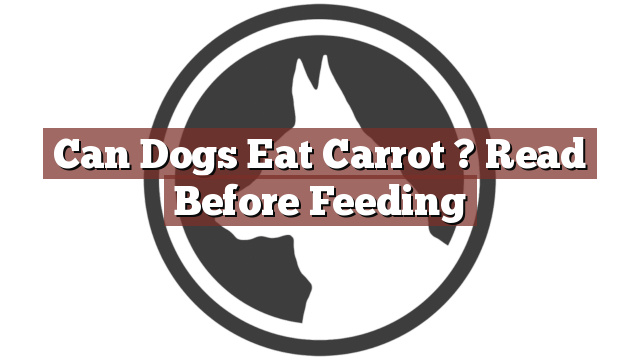Understanding Your Dog’s Dietary Needs
As a dog owner, it is crucial to understand the dietary needs of your furry companion. Dogs, like humans, require a balanced and nutritious diet to maintain their overall health and wellbeing. While it is essential to provide them with high-quality dog food, many pet owners wonder if they can incorporate certain human foods into their dog’s diet. One such food that often comes to mind is carrots.
Can Dogs Eat Carrot? Read Before Feeding
Can dogs eat carrots? The answer is yes! Carrots are not only safe for dogs to consume but are also a healthy addition to their diet. Carrots are low in calories and high in essential nutrients such as vitamins A, K, and C, as well as fiber. These nutrients can benefit your dog’s immune system, vision, and digestion.
Before feeding carrots to your dog, it is important to take a few precautions. First, make sure to wash the carrots thoroughly to remove any dirt or pesticides. Secondly, consider feeding them in small and manageable pieces, as large chunks may pose a choking hazard, especially for smaller breeds. Lastly, introduce carrots gradually into your dog’s diet to avoid any digestive issues or upset stomachs.
Pros and Cons of Feeding Carrots to Dogs
Feeding carrots to your dog has several advantages. Firstly, the crunchy texture of carrots can help to improve your dog’s dental health by reducing plaque and tartar buildup. Chewing on carrots promotes saliva production, which can help prevent gum disease and bad breath. Additionally, the high fiber content in carrots can aid in maintaining a healthy digestive system, preventing constipation, and regulating bowel movements.
However, it is important to note that while carrots offer numerous benefits, they should only serve as a supplement to your dog’s regular diet. Dogs are primarily carnivores, and their main source of nutrition should come from high-quality dog food that meets their specific dietary requirements. Carrots should never replace a balanced diet but rather be incorporated as a healthy treat or snack.
Conclusion: Consider Carrots as a Healthy Addition to Your Dog’s Diet
Can dogs eat carrots? Absolutely! Carrots can be a nutritious and beneficial addition to your dog’s diet. They provide essential vitamins and fiber, promote dental health, and aid in digestion. However, it is important to remember that carrots should not replace a balanced dog food diet but rather be offered as a supplement or treat. As always, consult with your veterinarian before making any significant dietary changes for your furry friend to ensure their specific needs are met. By incorporating carrots in moderation, you can provide your dog with a tasty and healthy snack that they will surely enjoy.
Thank you for taking the time to read through our exploration of [page_title]. As every dog lover knows, our furry friends have unique dietary needs and responses, often varying from one canine to another. This is why it's paramount to approach any changes in their diet with caution and knowledge.
Before introducing any new treats or making alterations to your dog's diet based on our insights, it's crucial to consult with a veterinarian about [page_title]. Their expertise ensures that the choices you make are well-suited to your particular pet's health and well-being.
Even seemingly harmless foods can sometimes lead to allergic reactions or digestive issues, which is why monitoring your dog after introducing any new food item is essential.
The content provided here on [page_title] is crafted with care, thorough research, and a genuine love for dogs. Nevertheless, it serves as a general guideline and should not be considered a substitute for professional veterinary advice.
Always prioritize the expert insights of your veterinarian, and remember that the health and happiness of your furry companion come first.
May your journey with your pet continue to be filled with joy, love, and safe culinary adventures. Happy reading, and even happier snacking for your canine friend!

